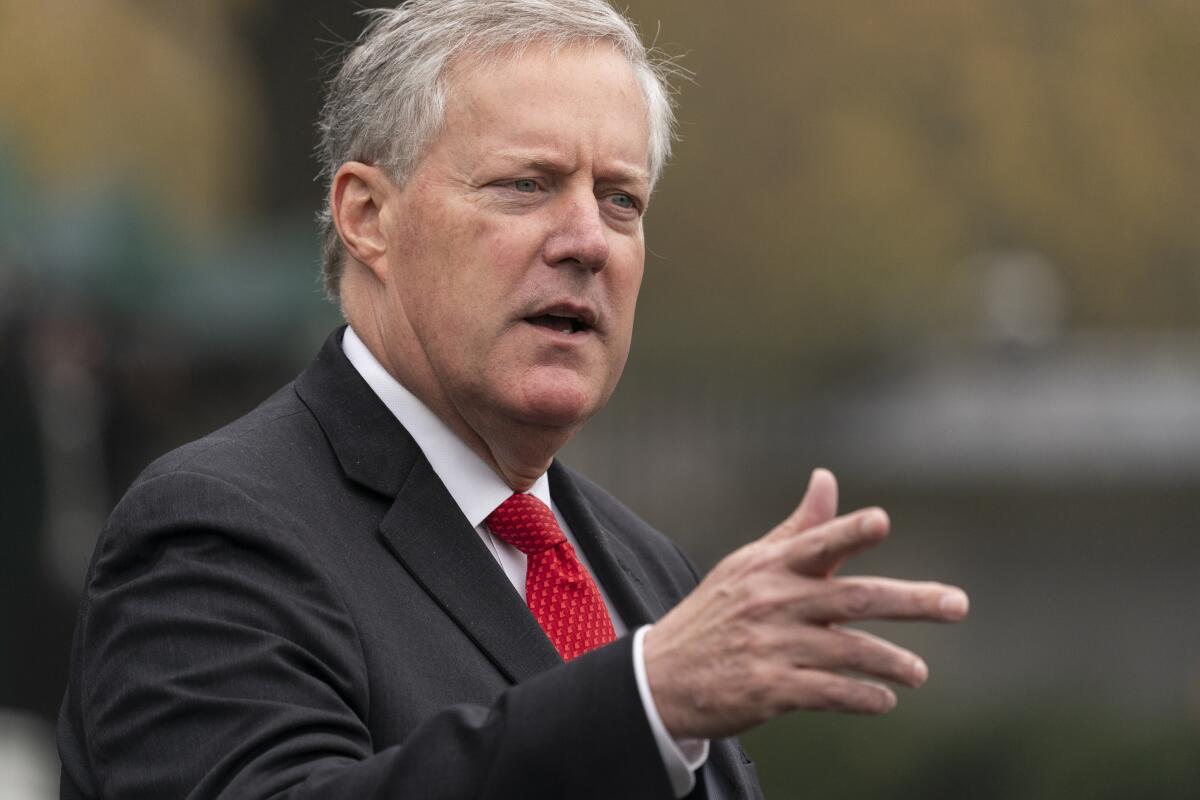Judge denies Mark Meadows’ request to move his Georgia election case to federal court

- Share via
ATLANTA — A judge on Friday denied Mark Meadows’ request to move his Georgia election subversion case to federal court, ruling that the Trump White House chief of staff must fight the charges in state court.
U.S. District Judge Steve Jones in Atlanta wrote in a 49-page ruling that Meadows had “not met even the ‘quite low’ threshold” to move his case to federal court, noting that the question was whether the actions at issue were related to his role as a federal official.
“The evidence adduced at the hearing establishes that the actions at the heart of the State’s charges against Meadows were taken on behalf of the Trump campaign with an ultimate goal of affecting state election activities and procedures,” Jones wrote. “Meadows himself testified that working for the Trump campaign would be outside the scope of a White House Chief of Staff.”
The ruling is a big early win for Fulton County, Ga., Dist. Atty. Fani Willis, who spent 2½ years investigating and building the case against former President Trump, Meadows and 17 others before a grand jury approved a sweeping indictment under Georgia’s anti-racketeering law last month. Willis has said she wants to try all of the defendants together.
The former president, a Republican who is seeking reelection in 2024, has indicated that he also is considering asking for his trial to be moved to federal court, and several other defendants have already made such requests. Jones’ ruling against Meadows could signal that the others also may struggle to meet the burden required to win removal to federal court when their lawyers make their arguments before the judge later this month, though Jones made clear that he would assess each case individually.
The practical effects of moving cases to federal court would be a jury pool that includes a broader area than overwhelmingly Democratic Fulton County, and a trial that would not be photographed or televised, as cameras are not allowed inside federal courtrooms.
But moving the cases would not open the door for Trump, if he’s reelected in 2024, or another president to issue pardons, because any conviction would still be under Georgia law.
Meadows is expected to appeal Friday’s ruling. In a court filing earlier this week, he asked to have his case separated from those of the other defendants and to have his proceedings in state court halted until a final determination is reached on his attempt to move to federal court, “including through appeal, if an appeal is taken.”
A spokesperson for Willis declined to comment Friday.
Meadows, Trump and the others have pleaded not guilty to charges that they participated in a sprawling scheme to illegally try to overturn Trump’s 2020 presidential election loss in Georgia after the state’s voters had selected Democrat Joe Biden.
Meadows said his actions were taken as part of his role as chief of staff to the Republican president. He and his lawyers also argued that because he was a federal official at the time, the charges against him should be heard in federal court and ultimately dismissed for lack of merit.
Prosecutors said the actions laid out in the indictment were meant to keep Trump in office after he lost to Biden. They said the acts were explicitly political in nature and are illegal under the Hatch Act, which restricts partisan political activity by federal employees. Therefore, they said, the case should remain in Fulton County Superior Court.
Meadows served as Trump’s fourth and final chief of staff after being tapped in March 2020 to replace Mick Mulvaney. Before becoming the president’s top aide, Meadows was a congressman representing North Carolina.
First elected in the post-tea-party wave of 2012, Meadows quickly established himself as a leader of a new generation of conservative Republicans on Capitol Hill. He served as chairman of the right-wing Freedom Caucus, and his actions in the House helped spur Speaker John A. Boehner’s sudden retirement.
As Trump ascended in the 2016 GOP race, Meadows switched from his earlier backing of Sen. Ted Cruz of Texas and became a Trump supporter.
Jones wrote that the evidence “overwhelmingly suggests” that most of the actions attributed to Meadows in the indictment did not fall within “his scope of executive branch duties.”
“Even if Meadows took on tasks that mirror the duties that he carried out when acting in his official role as White House Chief of Staff (such as attending meetings, scheduling phone calls, and managing the President’s time) he has failed to demonstrate how the election-related activities that serve as the basis for the charges in the Indictment are related to any of his official acts,” the judge wrote.
Jones also made clear that he was making no judgment on the merits of the case against Meadows or any defense he might offer.
More to Read
Get the L.A. Times Politics newsletter
Deeply reported insights into legislation, politics and policy from Sacramento, Washington and beyond. In your inbox three times per week.
You may occasionally receive promotional content from the Los Angeles Times.










